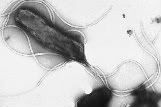 Helicobacter pylori is, by bacteriological standards, a relative newcomer to medicine. Although its pathogenesis has been studied for only about the past 20 years, there are reports from as far back as the late 19th century of small, helical bacteria in the stomachs of some patients. Largely these anecdotal reports were relegated to the "hmm, interesting" file and not followed up for many years. It wasn't necessarily that others didn't follow (or care about) the research; the lack of studies on them, despite occasional reports in the literature, is probably due more to the fact that we hadn't figured out yet how to culture them outside of the body. Prior to the era of molecular biology, this made studies of bacteria such as Helicobacter difficult, if not impossible.
Helicobacter pylori is, by bacteriological standards, a relative newcomer to medicine. Although its pathogenesis has been studied for only about the past 20 years, there are reports from as far back as the late 19th century of small, helical bacteria in the stomachs of some patients. Largely these anecdotal reports were relegated to the "hmm, interesting" file and not followed up for many years. It wasn't necessarily that others didn't follow (or care about) the research; the lack of studies on them, despite occasional reports in the literature, is probably due more to the fact that we hadn't figured out yet how to culture them outside of the body. Prior to the era of molecular biology, this made studies of bacteria such as Helicobacter difficult, if not impossible.
However, studies began in the late 1970s by Robin Warren and Barry Marshall led initially to the culture of Helicobacter pylori (previously designated Vibrio rugula and Campylobacter pylori) from human stomachs--and a quarter-century later, a Nobel prize for their discovery and subsequent work showing the relationship between Helicobacter pylori and gastritis and gastric ulcer disease. The bacterium has also been shown to play a role in the development of several types of gastric cancers.
Additionally, Helicobacter research has extended far beyond the stomach, providing clues about the development of other diseases and even human migration. I'll write more about these topics later this week, highlighting two new papers featuring this fascinating gastric bacterium.
Image from http://upload.wikimedia.org/wikipedia/commons/d/d6/EMpylori.jpg
- Log in to post comments

What a tease.. the introduction is all stuff I already know, then two sentences telling me about cool NEW stuff that you're going to talk about... later this week.
Needless to say, I'm eagerly awaiting more posts on this topic.
Has anyone compared the helicobacter pylori studies of human migration with the lice-based studies of human migration? How about with the human genetics-based studies of human migration?
Alternative Title? "How to win the Nobel prize by drinking a pint". There was a fantastic program on TV the other day about the history of self-experimentation in medicine. It ended with the Marshall Warren story.
I heard a piece on NPR's Science Friday this past week about an apparent relationship between H. Pylori and childhood allergies. One of the many speculations about the relationship was that H. Pylori was simply a marker for micro-floral equilibrium in the gut, where the equilibrium was more important in somehow regulating allergic (inflammatory) response. I'd very much appreciate your take on microfloral populations and symbiotic equilibria (I'm sure such a thing must exist) in our stomachs (the estimate was something on the order of 90% of all cells in our guts were bacteria?)!
I'm at UVa, not in medicine, and recall that Dr. Marshall was/is quite the contrarian and although he was gracious enough to accept on our behalf, and the University was quite pleased to claim him and the prize, his research was not so well received at the time. I guess unorthodoxy always grates.
Looking forward to it!
I've just been reading about how Helicobacter pylori eradication has some unintended negative side-effects, like obesity, acid reflux, and esophageal cancer...
appreciate, be indebted to smb.